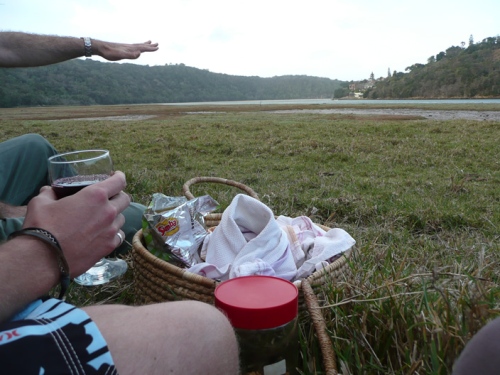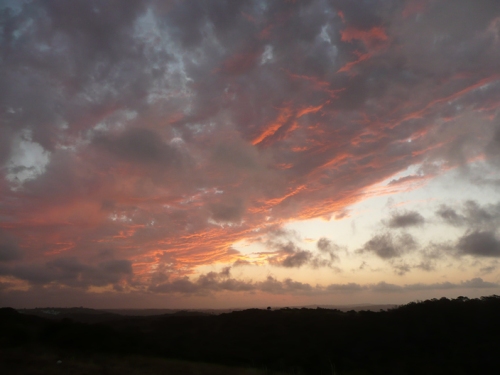At 4pm we return to Ron’s house to rendezvous for the trip to Gqunube (pronounced G – palatal click – unoobie) where the sustainable farming project is. The idea is to sell the plots to people who are committed to living in an environmentally harmonious fashion. Would-be purchasers are required to attend 3 of 4 courses on topics about sustainable farming, and must submit their request to purchase with a statement of intent. It appears that the directors of the project are taking their vision very seriously, which I find gratifying.
Of course, like everywhere else there is an uneasy relationship between the ecology movement and land developers. A golf course is going in nearby – a fact that Ron reveals with evident ambivalence. “We do not want the golf course, but they have promised to fix the road.” His hand on the wheel deftly manoeuvres the vehicle to avoid large rocks and hit the deep grooves at an angle. “I guess that is our price,” he smiles ruefully.
Interestingly, although there is not an infrastructure for large scale recycling and composting like there is in Canada (resulting in a lot of plastics polluting the roadsides etc), the people here seem to be quite committed to the principles of sharing and reusing. For example, leftover food from a restaurant will be given away instead of thrown out, whereas in Canada that practice would be seen to diminish the value of the food itself. In fact, the culture of sharing is prevalent to the degree that to decline when offered something can seem rude. I am beginning to learn to accept what is offered (a cup of tea or somewhere to sit down, for instance). I think I like it this way better than the default “no, thank you” I am used to from home. It helps build community, this sharing.
The land at Gqunube is beautiful. When we pull up to the farm, five or six monkeys let themselves down out of the tree in the front yard and chattering, take their leave into the underbrush. Monkeys here are like raccoons in Toronto – they are pests who get into everything. Farmers must find ways to keep them out of their gardens with cages and fences and locks. Still, they are freaking cute and I can’t help but coo and gasp, “Monkeys!”
The farm has flower, vegetable and herb gardens (complete with monkey-fences), a pond, a public building with common meeting space, some chickens, a composting toilet and a solar-powered outdoor oven. The development is in its infancy but everywhere is evidence of impassioned and creative invention.

The common building, Gqunube. The walls are made of earth (no concrete here) and all the wood is reclaimed from railroad ties and shipping crates.

The view of the Gqunube River from the common building crowsnest.
After the tour, Ron takes us down to the banks of the Gqunube River. He’s prepared a picnic basket with chips, nuts, and wine. We snack in the tall grass by the banks of the river, eyes peeled for a glimpse of the puff adder (DANGER!) whose territory we are in.

Ron casts his hand over the salt flats on the Gqunube River.

It's really windy in Africa.
It is falling dark so we pack up and head out towards the main road. Ron takes us to see the sun set, which happens alarmingly quickly – less than 5 minutes between the bottom edge of the sun touching the horizon to blackness.

African sunset

After the sun goes down, the rays of sunlight light up the underside of the night sky clouds. Again, all the toes on my left foot for a wide angle lens.
Ron drives us back to his home for dinner with his family, including his teenaged children Rachael and Nathan, his wife (who is blessed with the John Irving-esque name, Dr. Anthea Klopper), and Anthea’s mom. These are wholesome salt-of-the-earth people. The children say “please” and “thank you”, and they help serve the food without being asked. Naturally, my brain is filled with every disgusting swear word and offensive turn of phrase I have ever heard. I spend much of the supper concentrating on saying nothing, afraid that an errant “sonofabitch” will sneak into a request to pass the pepper.
After dinner we say our good-nights and head home. This day began at 6:45 am to bring food to the church. I have paddled the Nahoon, visited Nahoon and Bonza Bay beaches, climbed several sand dunes, rubbed lemon in my hair, visited a farm, drank wine as the African sun went down, and had dinner around a family table – a very full, absolutely perfect National Heritage Day.


The common building is beautiful!!
Also, “rubbed lemon in my hair?” Is that because you’re trying for highlights the natural Sun-In way?
Look at you all windswept in, of all places, AFRICA!! 🙂
Is a “puff adder” a poisonous snake or another dreadful brand of African puffed corn snack/chip/cheesy poof thingy?
Disregard Sun-In comment. Just read your post from the 28th. I knew there was a reason you’re supposed to read these things in order!
Mmmm, Simba Brand Puff Adder snacks. With real venom for a true mouth quivering experience.
Puff adders, sharks, monkeys. It’s a continent of kooky critters!